Sinus pain. Sinus pressure. Chronic sinusitis. For some of us, those words inevitably conjure up images of repetitive sneezing, red and puffy eyes, drippy noses, boxes of tissues, and hankies jammed into our pockets.

Many of us know the woes of living with sinus pressure and what it feels like to suffer through bouts of congestion, noses dripping like faucets and, even worse, extreme pressure, headaches, and infection. Sometimes it feels like a vice is gripping your head and is squeezing more and more tightly until you almost can't take the pain anymore.
Sometimes pressure builds and builds until it leaves you feeling dizzy and, at times, nauseous. Maybe it feels like you might be coming down with a cold or flu. No matter the symptoms, most of the time it just feels terrible.
When left unattended, continual sinus pain, congestion, and pressure can lead to an acute form of sinusitis, otherwise known as a sinus infection. When this occurs, all of the pain and pressure that is normally felt with regular symptoms of sinus issues are augmented and feel a thousand times worse. Many people report extreme facial tenderness, headaches, pressure in the ears, nose, and teeth, and nasal congestion.

More than 35 million people, all over the world, live with sinus issues on a regular basis and look for relief in many different forms whenever the issue arises. In fact, what is most commonly referred to as sinusitis is one of the most commonly treated conditions by physicians and has been for quite some time. In many cases, once sinus pressure and/or congestion settles into the body, a sinusitis or a sinus infection follows.
So, what happens when we think or know that we have an infection? What is really going on in our body? The sinuses are essentially pathways through which air flows within the bones around your nose. If those pathways become blocked or obstructed in some way, germs have a tendency to grow, causing infection.
What follows are flu-like symptoms such as fever, sore throat, coughing, and overall feelings of sinus pressure, congestion, and discomfort. If acute, the infection can last for periods of up to two weeks, even with antibiotics. If the infection lingers more than two to three weeks, chances are you have bacterial sinusitis which is considered chronic and can remain in the body for twelve to fifteen weeks if left untreated.

Primary care providers most often prescribe a round of antibiotics to help the body fight off the infection or the virus. After all, when discomfort strikes, it is only natural to want relief as quickly and easily as possible.

Although this is standard procedure in most conventional doctor's offices, clinics, or other health care facilities, there is another, more holistic way to combat symptoms of sinus pressure, pain, and congestion. Harnessing the incredible power of plants and their essences and distilling that into essential oils is an ancient practice that was, and continues to be performed to help maintain optimal body performance and regain balance when our systems are out of alignment.

People all over the world rely on essential oils as their first and primary line of defense when they feel cold or flu-like symptoms creeping in, and they are almost always satisfied with the results. Whether using a diffuser or humidifier to infuse the oils into the air, adding oils to your bath, putting a few drops into your morning tea, using a steam method to send the healing vapors directly into your nasal passages and lungs, or applying topically, essential oils help people live their best and most healthy life, every single day.

There are a number of different essential oils that help the body stay strong and keep the immune system running properly. There are also essential oils that can be used when flu-like symptoms begin to set in and threaten to take hold. In this article, we will focus on those essential oils that help relieve symptoms and reduce the duration and magnitude of congestion, pressure, and headache.
Essential Oils for Sinus Congestion and Pressure
That which we call a "stuffy nose" is really just an inflammation in the sinus cavity or mucus membrane which causes a partial or total blockage in the passageways that carry air to the nose. More often than not, that stuffy feeling quickly turns to heavy congestion and pressure between the eyes and in the forehead, and sometimes even in the mouth and jaw, or behind the ears and running down the neck.

Pressure Points
Some people find that applying pressure to various points on the face provides temporary relief and helps to dislodge some of the mucus, thereby allowing the passageways a bit of movement. Using your index fingers to push on either side of the nose just at the base and holding that for about 3 minutes may offer some relief. You can also press your finger into the corner of the eye socket just above the eye for as long as desired, slowly moving your finger to the outer part of the socket just beneath the brow. Finally, slide your index finger under the eye just above the cheekbone, applying light but constant pressure for as long as feels comfortable. These are all simple techniques that can be done anywhere, at any time that really help relieve pressure, even if only temporarily.
Essential Oil Delivery Methods
In addition to acupressure, there are a number of essential oils that can be used for relief and a number of delivery methods.
Place 1-4 drops of the essential oil in your hand and rub hands together. Place your hands over your nose in a cup-like manner and breathe deeply, slowly, and repeatedly. You can also simply open the cap of the essential oil bottle and breathe deeply and repeatedly if you are on the go.
You can also place a drop of essential oil, mixed with a carrier oil, just beneath the nose in the depression above your upper lip. In addition to that, you can place a drop of oil behind the ears. This is one way to prolong the aromatherapeutic effects of the essential oil.

If taking a bath, place 10-15 drops directly into the water. Breathe deeply and enjoy the decongesting benefits.

If using the steam inhalation technique, boil a pot of water and add 6-8 drops directly into the water. Please a towel over your head, lean over the pot or bowl, and inhale through your mouth and nose. Do this for as long as the water is steaming and repeat as many times as your feel necessary throughout the day.

If using a diffuser, add 1-3 drops and allow the essential oil molecules to fill the air. Again, breathe deeply and refresh the oil whenever necessary. Alternatively, you can use a humidifier to achieve the same effect. Simply add 10-15 drops of essential oil to the humidifier and breathe deeply all day. Using a diffuser or a humidifier are wonderful methods, because they also allows the essential oil to combat any microorganisms that might be living in the air around you.

These delivery methods can be used for all of the following essential oils.
1. Peppermint Essential Oil
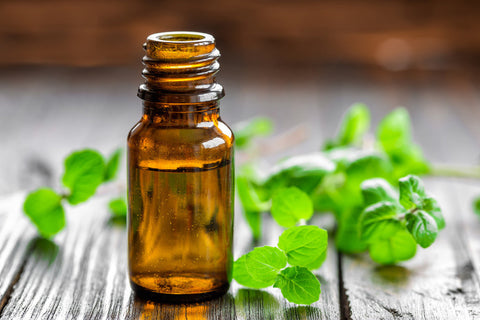
Peppermint essential oil, extracted from the leaves of peppermint (Mentha piperita) which was first found growing in England, is widely known and renowned for its ability to relieve sinus issues such as congestion and pressure that can sometimes lead to headaches and pain. it possesses highly astringent, antibacterial, anti-fungal, anti-inflammatory, antiseptic and antimicrobial properties, helping the body not only feel relief but also help it begin to heal itself.
Menthol, the primary organic compound found in peppermint essential oil, has been used for more than 2000 years as a health tonic and remedy. Its potency and mildly sedative properties make it perfect for sinus congestion and pressure.
If using topically, it is important to mix this oil with a carrier oil of your choice, as peppermint essential oil is rather toxic on its own. We recommend Tamanu, Jojoba, or Castor oil, or any of your preferred oils. Take care to find a carrier oil that does not have a very distinct aroma because you want the essence of the peppermint oil to be the primary aroma.
Peppermint essential oil is a well-known go-to for those who live with chronic or acute sinus issues because it really works.
2. Tea Tree Essential Oil
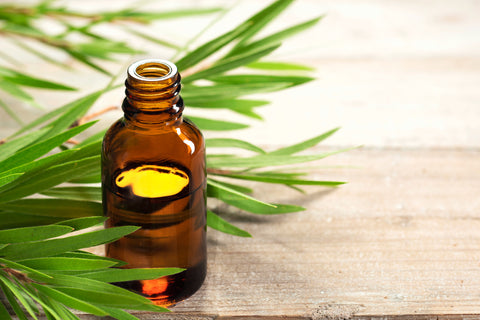
Tea Tree essential oil is a highly effective treatment for nasal congestion, sore throat, and cough. Extracted from the leaves of the Melaleuca Alternifolia tree, this essential oil was first brought into the public's eye by the famous explorer, Captain James Cook who, upon landing in New South Wales in 1770, found and brewed the leaves to make tea, hence the name "Tea Tree".
The Aboriginal people have harvested and used the leaves and bark of the Melaleuca tree for centuries, citing incredible antiseptic and healing properties. Captain Cook learned more about its medicinal benefits during his many visits to the Australasian continent, where he met with aboriginals who shared their various healing methods with him. Subsequently, he and his crew used tea tree essential oil while at sea so prevent scurvy and to treat wounds.
Within a few years, he introduced this essential oil to those on the mainland, where it gained increasing notoriety and became a highly marketable trading commodity throughout the world. As the years went on, it was used during world wars as an antiseptic before penicillin was discovered and helped to heal many wounded and was also highly sought after by many scientists and doctors.
Due to its antimicrobial and antiseptic properties, tea tree essential oil helps to eliminate the germs causing the symptoms of flu and colds. Any of the delivery methods will work, and, just like peppermint essential oil, it is necessary to dilute this oil with a carrier oil of your choice if you plan to use it topically. Some people prefer rubbing it directly on the chest, under the nose, or behind the ears so that the effects are longer lasting. Reapply upwards of 5-6 times per day to help relieve congestion or difficulty breathing.
Tea tree essential oil can be taken internally as well, but not swallowed. If you have excess mucus or a sore throat, add 2-3 drops to a glass of water and gargle, spitting the mixture out as you go. With repeated use, you will notice quite a difference.
3. Eucalyptus Essential Oil
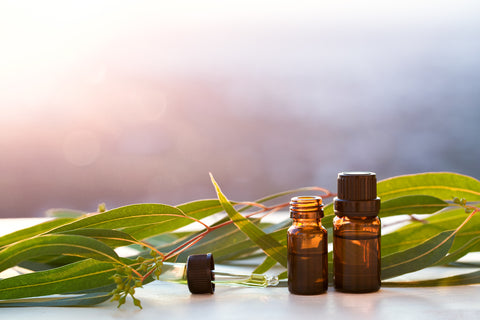
Said to be one of the most useful trees in the world, and in the same family as the Tea tree, the Eucalyptus tree, also known as Eucalyptus globulus, is native to Australia and has been used for centuries by the Aboriginal people as a general tonic and cure all. First distilled in 1788 by doctors who used the oil for bronchial and chest issues, Eucalyptus essential oil is a well known for its antiseptic, astringent, and antibacterial properties and was called, "Sydney peppermint" once introduced to Europe. It became a household name, and was used in remedies, tonics, cosmetics, flavorings, and even cleaning products. During world wars, it was used as an antiseptic to reduce susceptibility to bacteria and infection.
It primary component is the natural organic compound called eucalyptol, which has a mint-like aroma and a spicy yet cooling flavor. Used in many cough drops and syrups, it possesses antiviral, antimicrobial, antibacterial, and antispasmodic properties, all which help open block airways, relieve congestion, reduce the frequency and magnitude of a cough, and help combat overproduction of phlegm and mucus.
Just like the previous essential oils, Eucalyptus oil should be mixed with a more neutral carrier oil such as Jojoba or Olive oil, if using topically. Once mixed with a carrier oil, it can be applied directly to the chest as a vapor rub, where the properties are very effective and long lasting.
Many people mix 20-25 drops of this oil into a spray bottle filled with peroxide and mist in the air throughout the day to help eliminate airborne microbes that are keeping you unhealthy.
4. Oregano Essential Oil
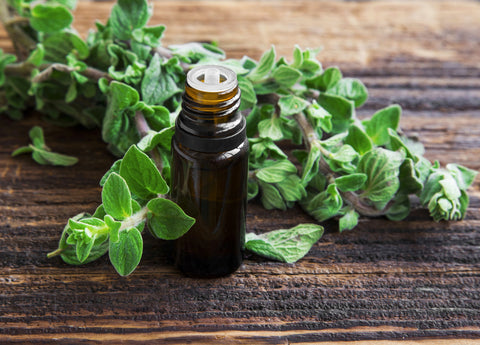
Oregano essential oil is highly regarded as one of the most useful and versatile essential oils on the planet. First used in ancient Greece to treat infection, it was also used in food to protect from bacteria, the oil of the oregano plant is extracted via the process of steam distillation of fresh oregano leaves. The plant itself is also known as Oreganum vulgare or simply, oregano.
Oregano essential oil contains high levels of thymol and carvacrol, two organic compounds that are scientifically recognized as having very powerful antibacterial, anti-inflammatory, and anti-fungal properties. In fact, carvacrol is known to fight bacterial infections, parasites, viruses, inflammation, allergies, tumors, fungal infections, and chronic sinus issues.
For all practical purposes, oregano oil is possibly nature's ultimate antibiotic. It helps prevent and treat infection by boosting and strengthening the immune system by aiding in the production and function of white blood cells.
Oregano essential oil is very powerful and should be taken with care. If using it topically, it is crucial to dilute with a carrier oil such as Jojoba or Olive oil. It can then be applied anywhere on the body, specifically around the nose and chest areas in order to help reduce mucus production and aid in breathing.
Unlike some other essential oils, oregano oil can be taken internally. Small amounts can be added to food, or it can be taken in supplement form. If taking it in isolation, it must be diluted with a 1:1 ratio of olive or coconut oil to oregano oil. With prolonged and regulated use, you will notice the overall effects on your body.
5. Thyme Essential Oil
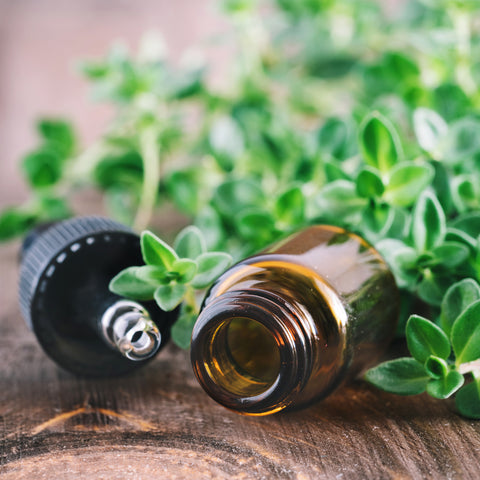
Thyme essential oil, also known as Thymus vulgaris and a member of the mint family, was orginally used by the Greeks, Egyptians, and Romans for various ways, such as embalming and as incense. The Greek word, "thymos" means "perfume," hence the proclivity to use it aromatically.
Native to southern Europe and the Mediterranean, the thyme plant has a number of health benefits, which have been recognized for thousands of years. It was also believed that thyme gave those who held it strength, bravery, and energy and a fresh sprig was given to soldiers and knights to carry with them on their journey.
Thyme essential oil is extracted form fresh or partially dried leaves and flowers of the plant via the process of steam distillation. The extraction process is lengthy and a very high amount of plant matter is needed to produce small amounts of the essential oil, so it has always been a highly prized commodity throughout history.
Thyme essential oil possesses antiseptic, antibacterial, and anti-spasmodic, and expectorant properties that make it an incredibly effective oil to use in the treatment of sinus congestion and pressure. It is one of nature's strongest antioxidants that supports the respiratory, immune, nervous, and other systems in the body.
Like many other essential oils, Thyme oil is very potent and must be diluted if applying topically. Use your choice of carrier oils and dilute to a 1:1 ratio for best results.
Thyme also blends well with many complimentary essential oils, which we will discuss later.
6. Lavender Essential Oil
Lavender essential oil comes from the English Lavender plant, also known as Lavandula augustifolia. Although considered by some a lighter, or less potent essential oil, it still possesses very beneficial properties, both for the body and the mind. And did I mention the smell? With hints of musk, camphor, and just a touch of flowers, lavender is one of the most easily recognized and widely used essential oils in the world.
In addition to it incredible aromatic properties that act as a tonic for frazzled nerves, anxiety, and stress, Lavender is also known for its antiviral, anti-fungal, antiseptic, and anti-inflammatory properties. It is also used as a circulatory stimulant and an immune booster.
At the first sign of sinus congestion, incorporating lavender essential oil into your daily routine is important. Whether inhaling the aroma directly from the bottle, applying to various points on the body, steaming, or diffusing, its anti-inflammatory, antibacterial, and antimicrobial properties acts like a balm to the lungs and can also combat the flu-like symptoms and ease congestion.
Because this is a mild oil, there is no need to dilute it with a carrier oil.
Although seemingly gentle, the power of lavender should not be overlooked. In its quiet and subtle way, this essential oil has the ability to help break apart mucus, ease congestion, and soothe the spirit, all at the same time. Many people recommend using a diffuser or a vaporizer, as this will fill the room with calming and antibacterial air that is extremely beneficial to anyone.
7. Lemon Essential Oil
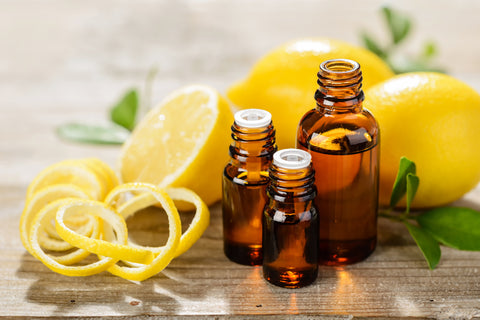
Lemon essential oil is another fairly astringent and highly stimulating remedy for sinus issues. Extracted from the lemon rind through a process of cold pressing, this highly effective oil supports the respiratory and lymphatic systems by helping the body break down and release mucus and relieve congestion. It also strengthens and boosts the immune system to reduce future occurrences of sickness.
In addition to this, lemons have strong anti-fungal, antibacterial, antiviral properties. Due to the high levels of citric acid, Vitamin C, calcium, and bioflavonoids present in this fruit, they are powerful germ and toxin fighters, helping to fight and eliminate the bacteria that leads to infection.
Lemon essential oil is very versatile and can be used daily in a number of ways. At the first sign of congestion or sinus pressure, rub 2-5 drops of lemon oil, mixed with your favorite carrier oil in a 1:1 ratio, on the chest and throat. Repeat this several times throughout the day.
This oil is safe for consumption and can be ingested without dilution. It makes a wonderful and soothing addition to hot tea when mixed with honey and helps soothe upper respiratory issues, such as congestion and sore throat.
One of the most effective methods of delivery for lemon essential oil is via a diffuser, humidifier, or direct steam. A diffuser is wonderful because it fills the room with detoxifying and cleansing microbes that work all day to rid the air of germs and bacteria.
8. Rosemary Essential Oil

A member of the mint family, Rosemary, also known as Rosmarinus officinalis, originates in southern Europe and the Mediterranean region. The essential oil is extracted form the leaves of the plant through a process of steam distillation.
Rosemary has strong antibacterial and anti-fungal properties, making it an excellent essential oil for strengthening the immune system and helping to cleanse the lymphatic system, which helps to maintain and increase overall health.
Rosemary essential oil also has incredible antiseptic properties, making it a very useful treatment when respiratory infections inhabit the chest. When congestion hits, massage a few drops, mixed with your favorite carrier oil such as Emu, Jojoba, Olive, or Tamanu, into the chest and throat. Repeat this several times throughout the day. You can also carry a bottle of this wonderful essential oil with you and, whenever needed, inhale deeply through the nose for am immediate sense of calm and relief.
Steam is a wonderful delivery method for this aromatic and detoxifying essential oil, as is diffusing. If using the steam method, repeat the process 2-4 times per day, on an as needed basis. If diffusing into a room, be sure to replenish the oil as it runs out to ensure a room filled with all of the antibacterial and antiseptic properties that rosemary essential oil has to offer.
8. Cinnamon Essential Oil
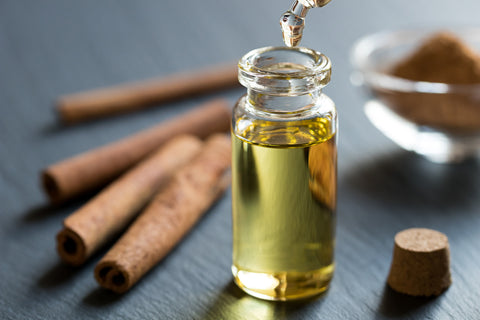
Cinnamon essential oil, sometimes called Cinnamon leaf oil or Cinnamon bark oil, is a powerful tonic for the body and soul. The cinnamon tree is native to Sri Lanka and other parts of Asia and is commercially cultivated throughout the region. It is one of the world's oldest trees, finding its way to parts of Africa such as Egypt, where it was considered of extremely high value and was only used by the most wealthy and those of royal birth. Its healing virtues are numerous and far reaching, and its benefits are many.
The bark of the Cinnamon tree is and has been used as a spice for thousands of years. The leaves of the tree hold the essential oils of the plant and, through a process of steam distillation, the oils are extracted and further refined into the essential oil that we use today. The bark can be incorporated in the distillation process at well, making it a tree that is full of abundance and holistic properties.
Cinnamon oil has incredible antibacterial, anti-inflammatory, antiviral, and antiseptic properties. With just one sniff of this woody, spicy, musky, and sweet aroma will leave you with no doubt that this oil has the ability to heal.
Cinnamon oil also has very high levels of antioxidants. In fact, some reports say that it has more antioxidants than any vegetable or fruit, which boosts the immune system and help prevent bacteria from entering the body and wrecking havoc on our systems.
As an anti-inflammatory, Cinnamon cannot be rivaled. When the mucus membranes become inflamed and swell, air has a more difficult time moving through the air ways in the nose. Breathing this potent aroma will help reduce inflammation and clear the airways, allowing you to breathe more easily.
Cinnamon essential oil is potent and can irritate or even burn the skin. Therefore it must be diluted before applied topically with your choice of carrier oil. After dilution, which should be 2:1 ratio of carrier oil to cinnamon oil, rub 3-5 drops on the chest to aid breathing and reduce congestion. It is imperative to properly dilute this oil because it is very strong.
Cinnamon essential oil is best suited for a diffuser or humidifier, as its antibacterial properties help fight the microbes floating freely in the air that can cause sickness. Be sure to refill the oil as needed throughout the day for best results.
Although ground cinnamon can be ingested as a spice, the essential oil cannot. it is so potent that it could have harmful effects on the body. The best and most effective ways to use this powerful healing oil is via a diffuser or by inhaling the aroma directly from the bottle.
9. Clove Essential Oil

Another natural powerhouse, clove essential oil is a force to be reckoned with. Native to many regions in Asia and historically one of the first spices to be traded throughout the world, the aromatic flower buds and harvested, dried, and then distilled with steam in order to extract the essential oils present in the plant.
Clove oil is filled with anti-inflammatory, antiseptic, and antibacterial properties and helps reduce the severity of sinus congestion.
This oil is very strong and must be diluted accordingly if using topically. A 2:1 ratio of carrier oil to clove oil is recommended in order to avoid irritation to the skin. Massaging clove oil into the chest and bridge of the nose helps alleviate congestion and aid in breathing.
Clove essential oil can be ingested. If desired, add 3-5 drops of oil to your hot tea or a glass of hot water. Taking clove oil internally once per day is very beneficial to the respiratory and immune systems and will help reduce the magnitude and duration of the symptoms.
Another fantastic way to use clove essential oil is via a diffuser or humidifier, so that its healing properties freely move through the air, destroying the harmful bacteria and free radicals present that can cause sinus issues, including inflamed nasal passages, sore throat, and congestion. Be sure to refill the diffuser or humidifier as needed throughout the day to ensure adequate inhalation.
If you feel congested or have other sinus issues, we recommend carrying clove oil with you and, whenever you feel like you need it, simply removing the cap, lifting to your nose, and breathing deeply a few times. You will immediately feel the effects and notice a difference in your breathing and level of congestion.
Overall, clove oil is a wonderful essential oil to use to help boost the immune system, heal the respiratory system, fight infection and bacteria, and help reduce congestion in the nasal passageways.
10. Pine or Cedarwood Essential Oil
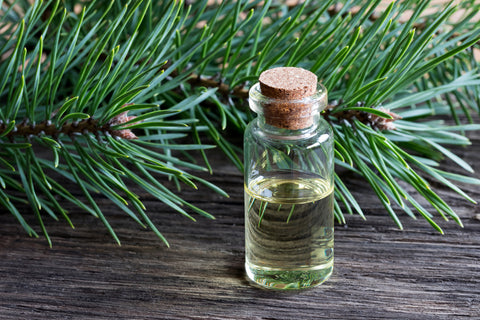
If you have an overproduction of mucus due to an sinus infection or inflammation, pine or cedarwood essential oil are effective treatments. The cool and almost astringent aroma helps loosen phlegm and mucus, thereby helping the respiratory system function properly.
Extracted from the leaves of the pine or cedarwood tree which are native to regions in North America, these essential oils have been used for centuries to fight against inflammation and bacteria. They have incredible antiviral, antiseptic, and anti-inflammatory properties and can be used daily to help treat congestion, inflammation, and other respiratory issues.
Pine or cedarwood essential oils should be used via diffuser, humidifier, or steam inhalation. If you are in a hurry or on the go, carry a bottle of this potent oil with you and simply breathe deeply over the open container a few times whenever needed throughout the day. With repeated use, you will notice a marked difference in the performance of your respiratory system and a drastic reduction the the duration of your symptoms.
Supercharged DIY Vapor Rub for Sinus Congestion
When sinus and respiratory problems strike, threatening to keep you home from work or out of school because sleep is elusive and, as soon as you lie down to rest, overproduction of mucus leads to coughing, sore throat, and congestion, many people choose an over the counter vapor rub to help ease the severity of the symptoms and help them get some rest. No one can afford to be sick, so of course quick and easy remedies make it seem like everything is fixed, without any of the hassle or wait time.
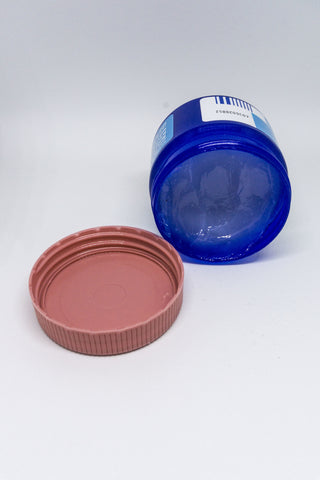
Although it may feel like these rubs immediately work, doctors note that vapor rubs do nothing to actually relieve the congestion because they do not actually treat the symptoms at all. In fact, studies show that, when tested, these vapor rubs increase mucus production in the body and also tend to restrict the nasal passages even further once the effects wear off.
Some even go so far as to say that these rubs make the symptoms worse when used for long periods of time. Like putting a band aid on an infected wound and doing nothing to clean it or make it better, the infection or inflammation only worsens over time. High levels of menthol present in these vapor rubs make the brain think that the nose is clearing out when, in reality, the body is still producing mucus at an alarming rate.

Rather than relying on manufactured rubs that are filled with chemicals and unnatural ingredients, why not make your own? With only a few natural, organic ingredients you can create a wonderful and soothing vapor rub that actually treats the symptoms of inflammation and infection and effectively reduces the magnitude and duration of your sinus issues.
The ingredients are as follows;
- 1/2 cup grated beeswax
- 1/2 cup coconut oil
- 20 drops peppermint essential oil
- 20 drops eucalyptus essential oil
- 10-15 drops rosemary oil
- 8-10 drops cinnamon oil
- Place grated beeswax and coconut oil in a pint sized mason jar
- Place jar in a pot and fill pot with about 3 inches of water
- Put pot on stove and heat, at medium temp, until everything is melted
- Add essential oils and stir until completely combined
- Pour into a small container with a lid and allow to cool
That's it! Just a few simple steps and you've made a wonderfully aromatic, extremely effective vapor rub that not only provides relief from your sinus congestion, but also works to alleviate the symptoms related to your condition.
Use this as often as needed without any worry of harmful chemicals or unnatural ingredients like petroleum. It stores for many months, especially if kept in a cool place.
Effective Essential Oil Blends You Can Make At Home
If you ever wanted to make your own essential oil blends, here are a few combinations that are guaranteed to help with congestion, inflammation, and cough. These can be used for steam inhalation, diffusion, or direct inhalation. Also, if mixed with your choice of carrier oil, each of these blends works marvelously as a massage oil that can be applied often, as many times per day as needed.
Congestion Blend #1
- 5-7 drops pine or cedarwood essential oil
- 5-7 drops lavender essential oil
- 4 drops eucalyptus essential oil
- 1 drop lemon essential oil
Congestion Blend #2
- 2-4 drops rosemary essential oil
- 3-4 drops peppermint essential oil
- 2-3 drops eucalyptus essential oil
Congestion Blend #3
- 3-5 drops rosemary essential oil
- 2 drops thyme essential oil
- 1 drop peppermint essential oil
The Importance of Immunity
Building a strong immune system is the key to remaining healthy and infection free. If our bodies become weakened, run down, or compromised, viruses, bacteria, and other free radicals can break through our lines of defense and infiltrate our systems, bringing sinus issues, inflammation, and infection with them.
This is why we, at UpNature, believe in the importance of establishing a holistic routine that includes healthy and clean eating, daily vitamin and mineral supplements, exercise, and essential oils.
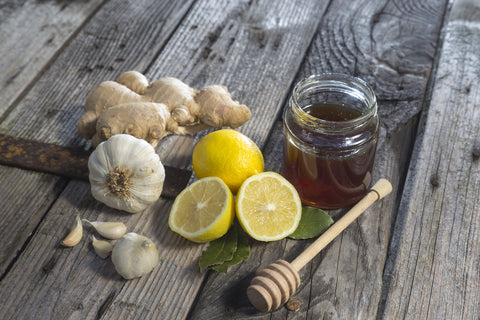
Essential oils contain concentrated amounts of the organic compounds extracted from plants that are extremely beneficial to any user. Essential oils have been used for thousands of years in many different cultures, and with great and overwhelming success.
So, if you are feeling like your systems could use a boost, consider harnessing the power of essential oils. With regular use, you will notice a difference in your physical, emotional, and mental health. And you never know, essential oils might just change your life!



Comments (0)
Back to Blog